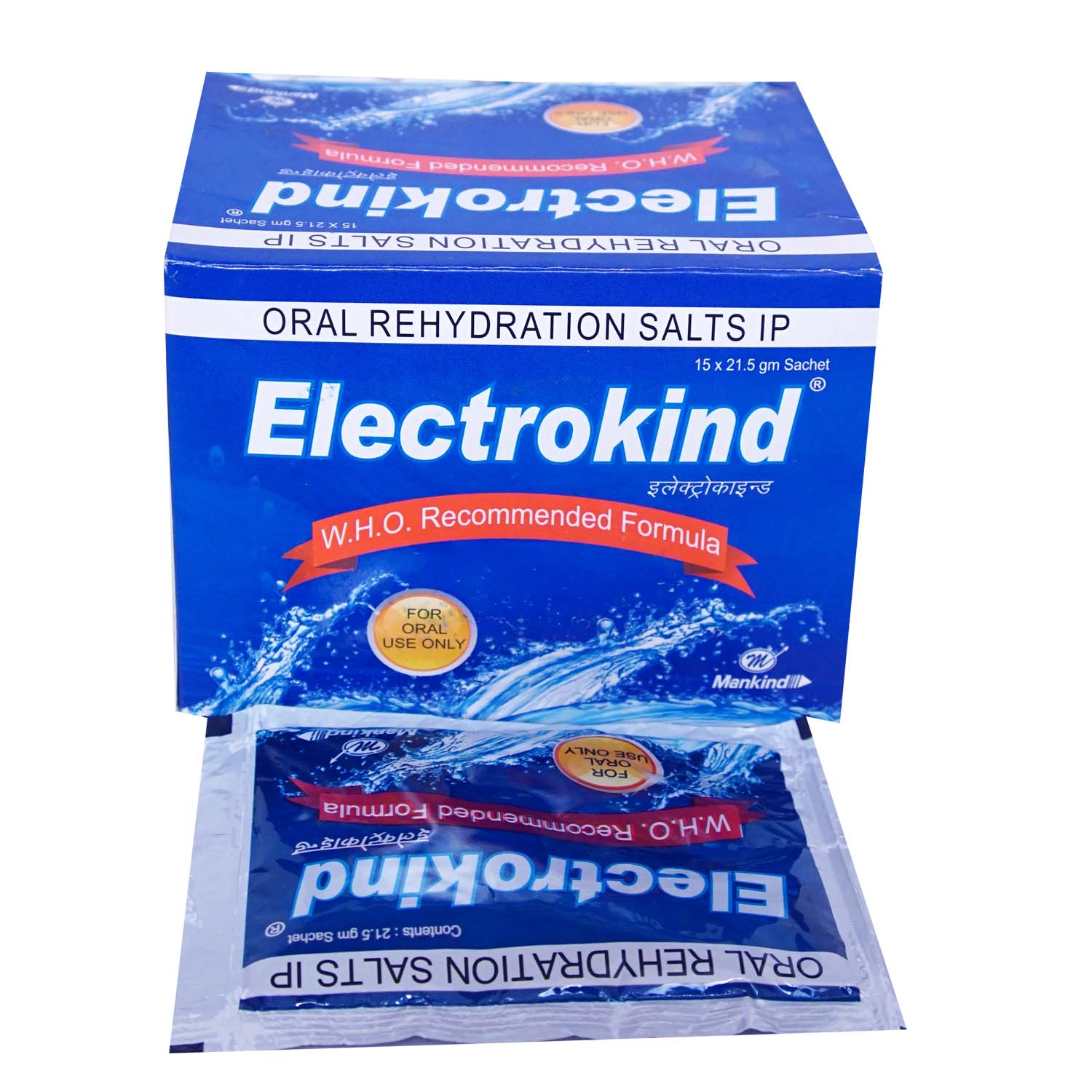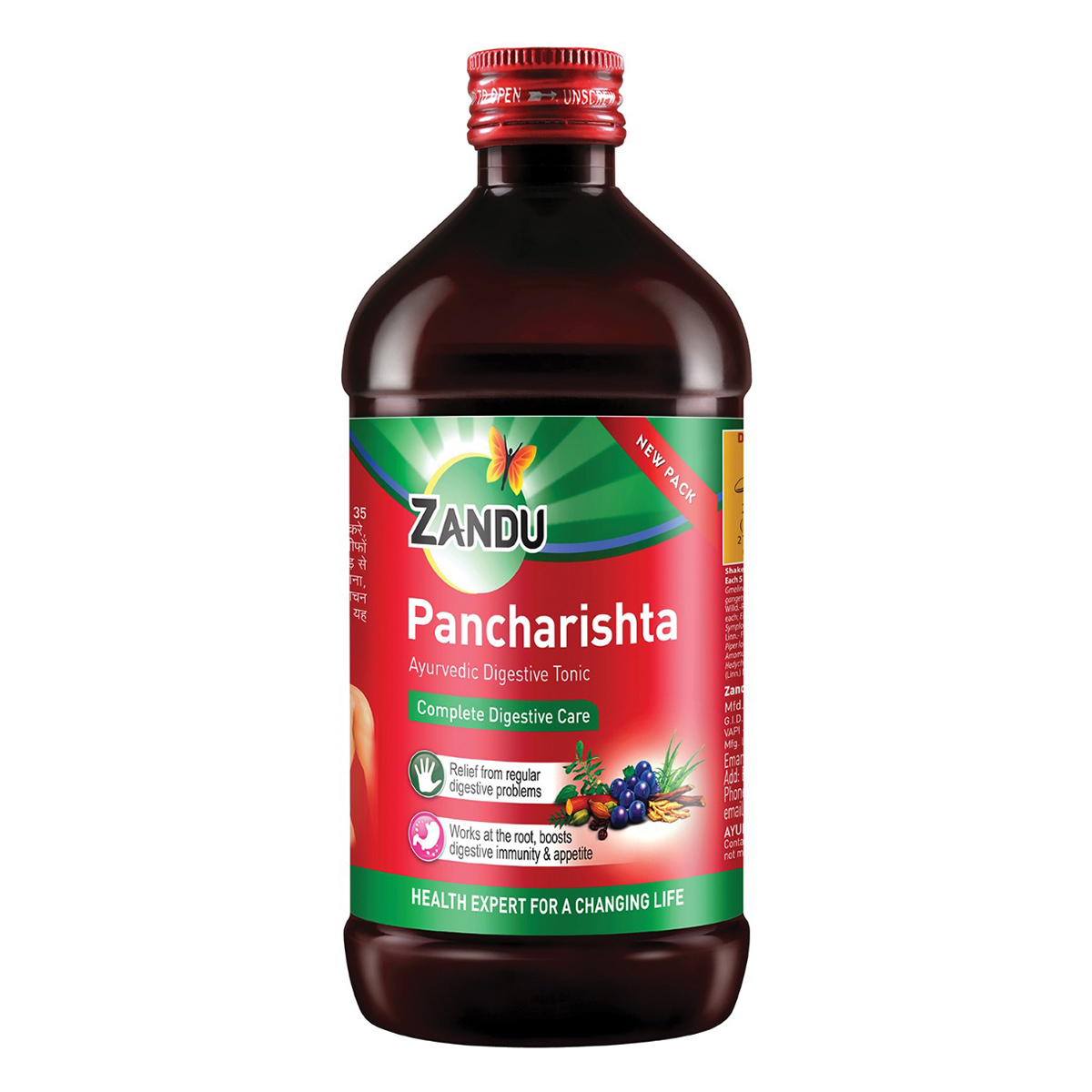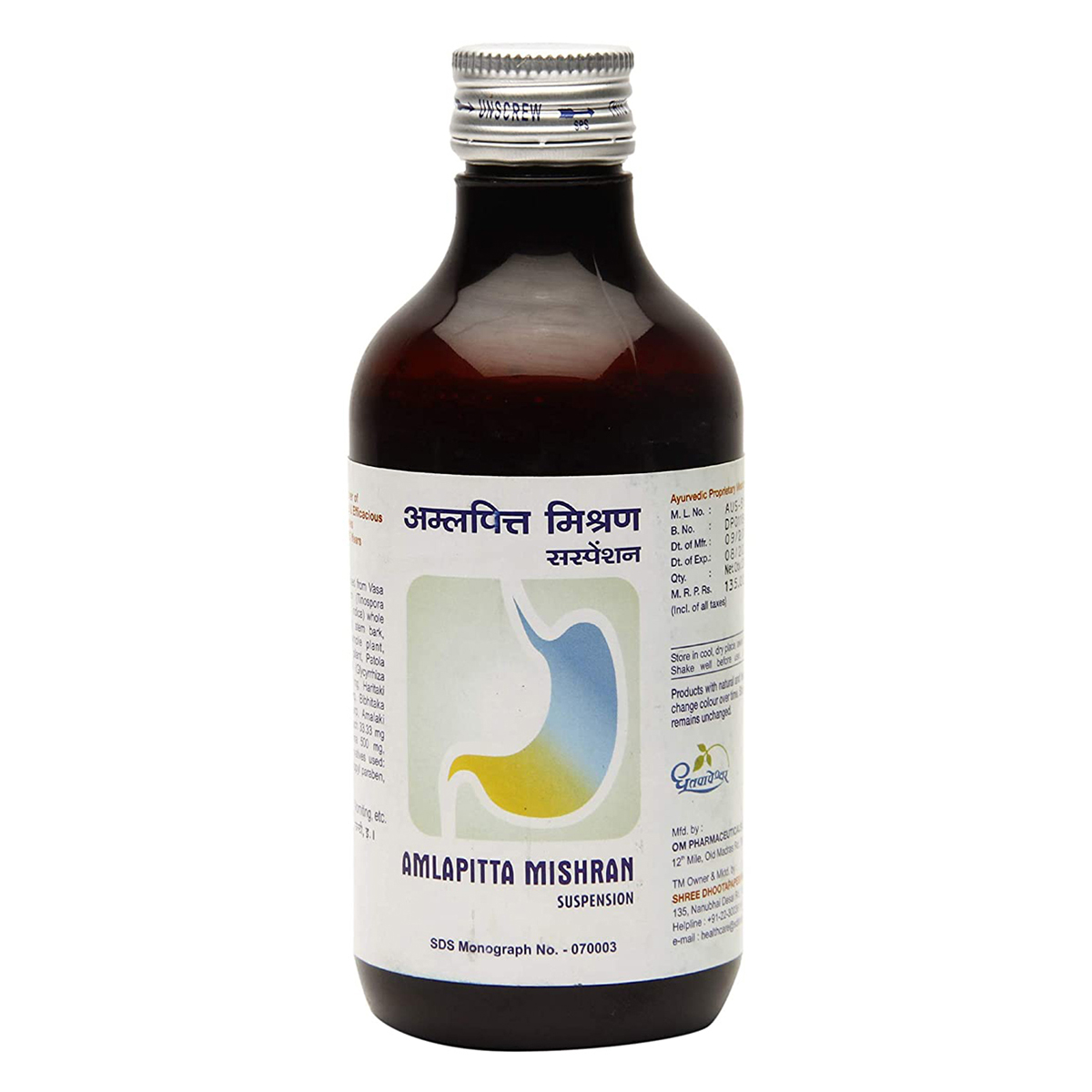Electrokind Sachet 21.5 gm
MRP ₹22
(Inclusive of all Taxes)
₹3.3 Cashback (15%)



Available Offers
Therapeutic Class
Author Details
We provide you with authentic, trustworthy and relevant information
Drug-Drug Interactions
Drug-Drug Interactions
Login/Sign Up
Taking Olanzapine with Electrokind Sachet 21.5 gm can increase the risk of stomach ulcers, bleeding, and gastrointestinal injury.
How to manage the interaction:
Co-administration of Olanzapine and Electrokind Sachet 21.5 gm is not recommended as it leads to an interaction, it can be taken if advised by a doctor. However, if you experience any symptoms like severe abdominal pain, bloating, sudden dizziness or lightheadedness, nausea, vomiting (especially with blood), loss of appetite, and/or black, tarry stools, contact a doctor immediately. Do not discontinue any medications without consulting a doctor.
Taking Biperiden with Electrokind Sachet 21.5 gm can increase the risk of stomach ulcers.
How to manage the interaction:
Taking Biperiden with Electrokind Sachet 21.5 gm is not recommended as it can lead to an interaction, but can be taken if prescribed by the doctor. However, if you experience severe stomach pain, bloating, sudden lightheadedness or dizziness, nausea, vomiting (especially with blood), decreased hunger, or dark, tarry stools, consult the doctor immediately. Do not discontinue any medications without a doctor's advice.
The combination of Amitriptyline and Electrokind Sachet 21.5 gm may cause stomach and upper intestinal discomfort. (Only applicable to an oral preparation)
How to manage the interaction:
Although co-administration of Amitriptyline and Electrokind Sachet 21.5 gm is not recommended as it can possibly lead to an interaction, they can be taken if prescribed by a doctor. If you experience severe stomach pain, bloating, sudden dizziness or lightheadedness, nausea, vomiting (in particular with blood), decreased hunger, and black stools while taking these medications, consult a doctor immediately. Do not discontinue any medications without talking to a doctor.
Taking Mepenzolate and Electrokind Sachet 21.5 gm(in tablet or capsule form) together can increase the risk of stomach ulcers, bleeding, and other gastrointestinal injury.
How to manage the interaction:
Taking Mepenzolate with Electrokind Sachet 21.5 gm is not recommended, as it can lead to an interaction, it can be taken if a doctor has prescribed it. However, if you experience severe stomach pain, bloating, sudden lightheadedness or dizziness, nausea, vomiting (especially with blood), decreased hunger, dark, tarry stools, consult the doctor immediately.
Using Eplerenone together with Electrokind Sachet 21.5 gm may significantly increase potassium levels in the blood.
How to manage the interaction:
Taking Electrokind Sachet 21.5 gm with eplerenone is not recommended. You can take these medicines if prescribed by a doctor. Consult a doctor if you experience nausea, vomiting, weakness, disorientation, tingling in your hands and feet, feelings of heaviness in your legs, a weak pulse, or an irregular heartbeat, consult the doctor immediately. It is essential to maintain proper fluid intake while taking these medications. Do not discontinue any medications without a doctor's advice.
Taking Doxepin with Electrokind Sachet 21.5 gm can increase the risk of stomach ulcers.
How to manage the interaction:
Taking Doxepin with Electrokind Sachet 21.5 gm is not recommended, as it can lead to an interaction, but it can be taken if a doctor has prescribed it. However, if you experience severe stomach pain, bloating, sudden lightheadedness or dizziness, nausea, vomiting (especially with blood), loss of appetite, or dark, tarry stools, consult the doctor immediately. Do not discontinue any medications without a doctor's advice.
Taking Phenindamine and Electrokind Sachet 21.5 gm (in tablet or capsule form) together can increase the risk of stomach ulcers, bleeding, and other gastrointestinal injury.
How to manage the interaction:
Taking Phenindamine with Electrokind Sachet 21.5 gm is not recommended, as it can lead to an interaction, it can be taken if a doctor has prescribed it. However, if you experience severe stomach pain, bloating, sudden lightheadedness or dizziness, nausea, vomiting (especially with blood), decreased hunger, dark, tarry stools, consult the doctor immediately.
Taking Dexchlorpheniramine and Electrokind Sachet 21.5 gm can increase the risk of stomach inflammation.
How to manage the interaction:
Taking Dexchlorpheniramine with Electrokind Sachet 21.5 gm (in tablet or capsule form) is avoided as it can lead to an interaction, it can be taken if a doctor has prescribed it. However, if you experience severe stomach pain, bloating, lightheadedness, vomiting, or dark stools, consult the doctor immediately. Do not stop using any medications without talking to a doctor.
Combining Orphenadrine with Electrokind Sachet 21.5 gm can increase the risk of stomach ulcers.
How to manage the interaction:
Taking Orphenadrine (citrate) with Electrokind Sachet 21.5 gm is not recommended, as it can lead to an interaction, can be taken if your doctor has prescribed it. However, if you experience severe stomach pain, bloating, sudden lightheadedness or dizziness, nausea, vomiting (especially with blood), decreased hunger, dark, tarry stools, consult the doctor immediately.
Taking Trospium with Electrokind Sachet 21.5 gm can increase the risk of stomach ulcers.
How to manage the interaction:
Taking Trospium with Electrokind Sachet 21.5 gm is not recommended as it may lead to an interaction, it can be taken if prescribed by the doctor. However, if you experience severe stomach pain, bloating, sudden lightheadedness or dizziness, nausea, vomiting (especially with blood), decreased hunger, or dark, tarry stools, consult the doctor immediately. Do not discontinue any medications without a doctor's advice.
Drug-Food Interactions
Drug-Food Interactions
Login/Sign Up
Drug-Diseases Interactions
Drug-Diseases Interactions
Login/Sign Up
Drug Warnings
Do not take Electrokind Sachet 21.5 gm if you are allergic to any of its contents. Inform your doctor if you have hyperkalemia, hyperglycemia, hypernatremia, hyperchloremia, fluid overload, and refeeding syndrome. Consult your doctor if you are pregnant or breastfeeding. Electrokind Sachet 21.5 gm should be given to children only if advised by a doctor. Keep your doctor informed about your health condition and the medicines you are taking to rule out any side effects/interactions.
Side Effects of Electrokind Sachet 21.5 gm
- Nausea
- Vomiting
Directions for Use
Medicinal Benefits Mweb
Key Benefits
Electrokind Sachet 21.5 gm is a combination of four drugs, namely: Sodium chloride, potassium chloride, dextrose, and sodium citrate. Electrokind Sachet 21.5 gm is used to treat or prevent dehydration (too much loss of body water). It is indicated as a source of electrolytes, water, and calories. Electrokind Sachet 21.5 gm helps in replacing the fluids and minerals lost due to vomiting or diarrhoea. Thereby, helps in treating and preventing dehydration.
Uses of Electrokind Sachet 21.5 gm
About Electrokind Sachet 21.5 gm
Electrokind Sachet 21.5 gm is a combination medicine used to treat or prevent dehydration (too much loss of body water). It is indicated as a source of electrolytes, water, and calories. A sufficient amount of fluids, electrolytes and minerals are necessary for the normal functioning of the body.
Electrokind Sachet 21.5 gm is a combination of four drugs, namely: Sodium chloride, potassium chloride, dextrose, and sodium citrate. Electrokind Sachet 21.5 gm helps in replacing the fluids and minerals lost due to vomiting or diarrhoea. Thereby, helps in treating and preventing dehydration.
In some cases, you may experience certain common side effects, such as mild nausea and vomiting. Most of these side effects do not require medical attention and will resolve gradually over time. However, you are advised to talk to your doctor if the side effects persist or worsen.
Let your doctor know if you are allergic to any of the contents. Consult your doctor if you are pregnant or breastfeeding. Electrokind Sachet 21.5 gm should be given to children only if advised by the doctor. Keep your doctor informed about your health condition and medicines to rule out any side effects.
Online payment accepted
know your delivery time
Provide Delivery Location
Author Details
We provide you with authentic, trustworthy and relevant information
Therapeutic Class
All Substitutes & Brand Comparisons
RX
Out of StockWinlyte ORS Orange Sachet 21.8 gm
Makers Laboratories Ltd
₹16.95
(₹0.7/ 1gm)
23% CHEAPER

Have a query?
Verified Buyers Reviews
Side Effects
Buy best Gastro Enterology products by
Abbott India Ltd
Sun Pharmaceutical Industries Ltd
Alkem Laboratories Ltd
Cipla Ltd
Torrent Pharmaceuticals Ltd
Intas Pharmaceuticals Ltd
Mankind Pharma Pvt Ltd
Lupin Ltd
Dr Reddy's Laboratories Ltd
Aristo Pharmaceuticals Pvt Ltd
Alembic Pharmaceuticals Ltd
Wallace Pharmaceuticals Pvt Ltd
La Renon Healthcare Pvt Ltd
Leeford Healthcare Ltd
Macleods Pharmaceuticals Ltd
J B Chemicals & Pharmaceuticals Ltd
Zydus Healthcare Ltd
Micro Labs Ltd
Zydus Cadila
Fourrts India Laboratories Pvt Ltd
Morepen Laboratories Ltd
Zuventus Healthcare Ltd
FDC Ltd
Eris Life Sciences Ltd
Cadila Pharmaceuticals Ltd
Medishri Healthcare Pvt Ltd
Alniche Life Sciences Pvt Ltd
Medley Pharmaceuticals Ltd
Tas Med India Pvt Ltd
Signova Pharma
Tablets India Ltd
Elder Pharmaceuticals Ltd
Wockhardt Ltd
Emcure Pharmaceuticals Ltd
Sanatra Healthcare Ltd
Glenmark Pharmaceuticals Ltd
Blue Cross Laboratories Pvt Ltd
East West Pharma India Pvt Ltd
Hetero Drugs Ltd
Indoco Remedies Ltd
Vasu Organics Pvt Ltd
Biological E Ltd
Primus Remedies Pvt Ltd
Akumentis Healthcare Ltd
Corona Remedies Pvt Ltd
Pfizer Ltd
Albert David Ltd
DR Johns Lab Pharma Pvt Ltd
Ajanta Pharma Ltd
Cadila Healthcare Ltd
Ipca Laboratories Ltd
Ordain Health Care Global Pvt Ltd
Systopic Laboratories Pvt Ltd
Ozone Pharmaceuticals Ltd
Foregen Healthcare Ltd
Medgen Drugs And Laboratories Pvt Ltd
Panacea Biotec Ltd
Samarth Life Sciences Pvt Ltd
Shine Pharmaceuticals Ltd
Adonis Laboratories Pvt Ltd
Dey's Medical Stores (Mfg) Ltd
Eskag Pharma Pvt Ltd
Hetero Healthcare Pvt Ltd
Indchemie Health Specialities Pvt Ltd
Meyer Organics Pvt Ltd
RPG Life Sciences Ltd
Troikaa Pharmaceuticals Ltd
Biochem Pharmaceutical Industries Ltd
Shreya Life Sciences Pvt Ltd
Sinsan Pharmaceuticals Pvt Ltd
3M India Ltd
Chemo Healthcare Pvt Ltd
Levin Life Sciences Pvt Ltd
Meridian Enterprises Pvt Ltd
Overseas Health Care Pvt Ltd
Saf Fermion Ltd
Sanzyme Pvt Ltd
Steris Healthcare
USV Pvt Ltd
Seagull Pharmaceutical Pvt Ltd
Votary Laboratories (India) Ltd
Win Medicare Ltd
Yuventis Pharmaceuticals
Aar Ess Remedies Pvt Ltd
Caplet India Pvt Ltd
Piramal Enterprises Ltd
Sanofi India Ltd
Cnx Health Care Pvt Ltd
Galpha Laboratories Ltd
Intra Labs India Pvt Ltd
Kinesis Pharmaceuticals Pvt Ltd
Msn Laboratories Pvt Ltd
Olcare Laboratories Pvt Ltd
Rapross Pharmaceuticals Pvt Ltd
Ronyd Healthcare Pvt Ltd
Saffron Therapeutics Pvt Ltd
Solariz Healthcare Pvt Ltd
Syndicate Life Sciences Pvt Ltd
Aurz Pharmaceutical Pvt Ltd
Biophar Lifesciences Pvt Ltd
Customers Also Bought
Frequently Bought Together
₹103.3
MRP ₹124
17% off
4
+₹185.4
MRP ₹206
10% off
1
+₹270.7
MRP ₹318.5
15% off
1
+

_0.jpg?tr=q-85)











